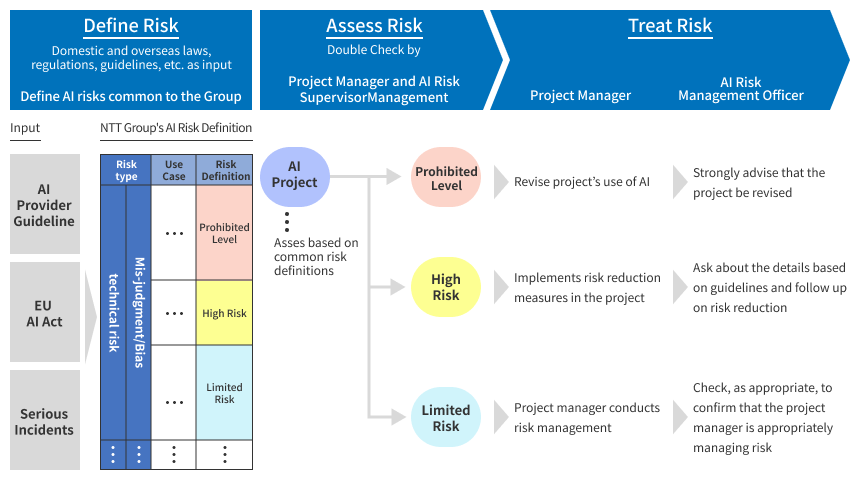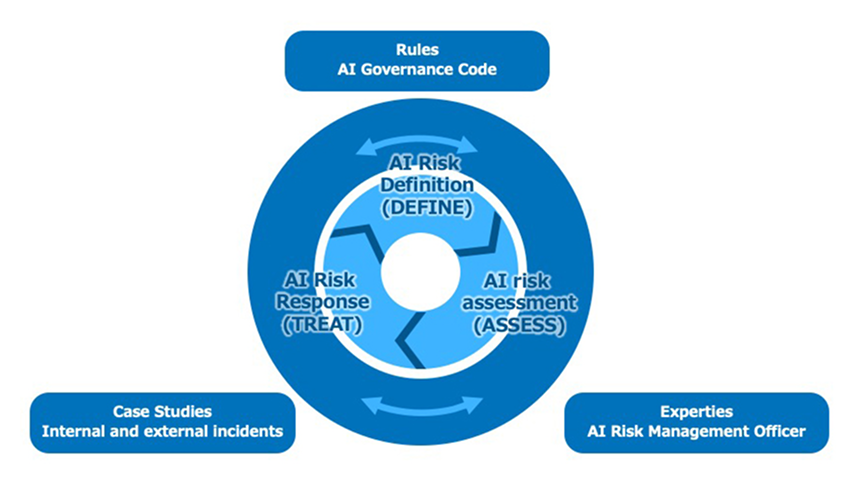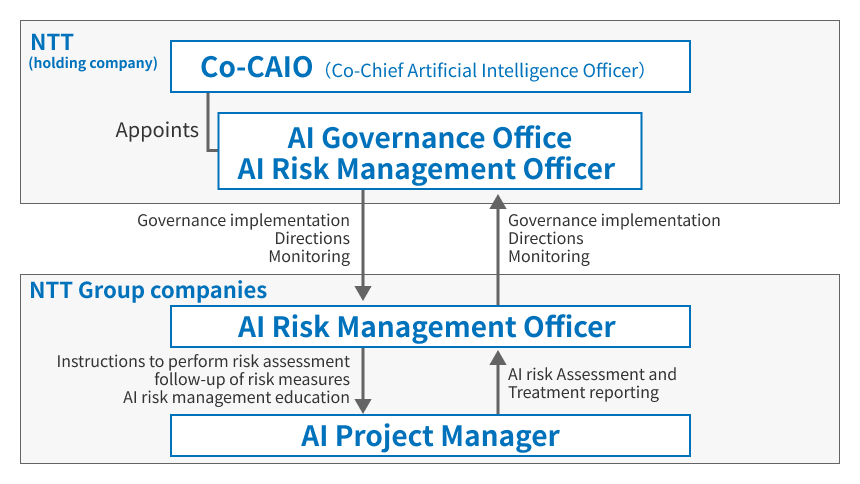

AI Governance
Our Policy and Approach
The NTT Group aims to promote AI utilization while balancing AI competitiveness and safety by addressing the demands of domestic and international risk management and governance standards.
AI (Artificial Intelligence) has rapidly integrated into society through technological innovations such as deep learning. It is solving countless problems both large and small every day without people even realizing it. However, there are also fears that the usage of AI may inadvertently cause discrimination, unfair restrictions on people’s behavior, or manipulation. Moreover, much of AI behavior and impact remains unknown and while expectations are rising so are anxieties. The International community is calling for AI risks to be addressed and for governance to be strengthened. To address these concerns and to simultaneously promote the use of AI to its full competitive potential while ensuring its safe use, it is necessary for the NTT Group —as a company involved in AI utilization and research and development—and its employees and engineers, to have a fundamental policy that guides their actions at all times.
AI Risk Management
It is important for organizations within the NTT Group that use AI in their business operations to manage the associated risks related to potential fines from legal violations, contract violations, social and ethical criticism, and so on. To Manage these risks, the NTT Group has adopted risk-based approaches widely used in the international community starting with the Hiroshima AI Process.
Defining AI Risk
The NTT Group classifies risks associated with AI usage into classifications of "prohibited level," "high risk ," and "limited risk" based on usage case across the entire Group.
Assessing AI Risk
Based on the above definition of AI risk, AI project managers and the AI risk management officer from their company will conduct two-layer risk assessments in order to ensure the accuracy of the evaluations.
Treating AI Risk
For AI projects assessed as having a "Prohibited level" the methods of AI usage will be significantly reconsidered. For projects assessed at non-prohibited levels, each company's AI risk management officer will work to reduce project risk and implement appropriate measures according to the level of risk, and advancement of the project.

Figure 1: Stepwise assessment of AI risk using a risk-based approach
Responding to AI Risks
The Acceleration of AI utilization requires careful balance with risk control. Instead of reaching for the brake pedal, The NTT Group aims to manage risk through a governance model of "accelerator and guardrails", ensuring our organizations can make fast progress forward while still having the necessary safeguards in place to prevent the worst outcomes when unforeseen circumstances occur.
Implementing AI Risk Management
Appropriately addressing AI risk requires a comprehensive approach that considers the perspectives of three key components: rules, examples, and expert knowledge.By collecting and analyzing rules and examples from not only within the NTT Group but also domestic and international sources, risk management capabilities can be continuously improved.
By assigning AI Risk Management Officers in each group company as experts who evaluate and respond to AI risks, we realize reliable AI management operations.

Figure 2: Rules, examples, and expert AI risk management practices
AI Governance Regulations
The NTT Group has developed an AI Governance Regulations framework encompassing international standards and guidelines from Japanese government and regulatory bodies, aiming to establish consistent definitions of AI risks and effective management practices for these risks throughout the entire organization.
The NTT Group's AI Charter
A policy that defines AI risk in a common way, establishing how AI governance mechanisms should be maintained and operated in order to implement the appropriate use of AI
Please refer here for more details.
The NTT Group AI Governance Policy
A policy that defines AI risk in a common way, establishing how AI governance mechanisms should be maintained and operated in order to implement the appropriate use of AI
NTT Group AI Governance Monitoring Rules
A set of operational guidelines to monitor the implementation and proper setup of various AI risk management systems across each company within the NTT Group, ensuring their appropriate operation.
NTT Group Guidelines on the Use of Generative AI
Guidelines outlining concrete risks and corresponding countermeasures that all NTT Group companies should commonly recognize and implement—categorized according to the distinct roles of "AI Model Providers," "AI Service Providers," and "AI Users"—in order to proactively prevent the occurrence of risks arising from generative AI usage, while promoting active utilization of generative AI and driving value creation.
Monitoring
To realize AI risk management across the entire NTT Group, continuous monitoring of the AI risk situation is conducted for each group company.
In each of these companies, AI risk management officers are appointed to conduct AI risk evaluations in coordination with AI projects and implement appropriate measures. The holding company collects the status of each company and conducts monitoring, supporting evaluations and measures as needed to promote proper AI risk management.
The holding company collects the status of each company and conducts monitoring, supporting evaluations and measures as needed to promote proper AI risk management.
Organization for AI Governance Implementation
NTT has a Co-CAIO in place to ensure leadership that can exercise control over promotion of the appropriate usage of AI and responses to AI risk. NTT has also put into place an AI Governance Office that assists the Co-CAIO by maintaining and revising the NTT Group's AI governance regulations, and by monitoring and assessing the state of AI risk management at Group companies. Each Group company has established an AI Risk Management Officer who assesses the risk of AI projects and works to reduce their risks.
The Co-CAIO, AI Governance Office, and AI Risk Management Officers at each of the NTT Group's companies will work together to promote appropriate AI risk management and AI governance at the NTT Group.

Figure 3: NTT Group's AI Governance Promotion Structure
Professional Development for AI Governance
At NTT, to enhance AI governance literacy across the entire group and achieve unified governance, we are promoting professional development for each company's AI risk management officers and employees.
Response for AI Risk Management Officers
For AI risk management officers, we hold briefings on educational content for employees to support the improvement of understanding AI governance and employee development.
Support for Employees
We use common content across the NTT Group to educate every employee so they can properly understand and respond to AI risks in their daily work.













